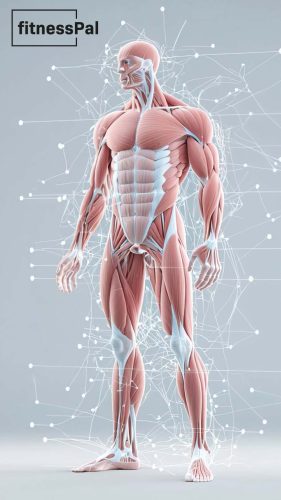Building muscle is more than just lifting weights – it's a journey that transforms both body and mind. Whether you're new to fitness or looking to level up your gains, understanding the basics of muscle building sets the foundation for your success. The science behind muscle growth is clear: it's a combination of smart training, proper nutrition, and adequate recovery.
Let's be real about what you can achieve. Research shows that beginners can expect to gain 1-2 pounds of muscle per month with dedicated training, according to Fitbod. Your results will depend on factors like genetics, age, and current fitness level. But don't worry – everyone can make progress with the right approach.
The three pillars of muscle growth work together like a well-oiled machine. Your workouts create the stimulus, nutrition provides the building blocks, and recovery allows your body to adapt and grow stronger. Think of it like building a house – you need the right materials (nutrition), proper construction (training), and time to let the cement dry (recovery).
Your muscle-building success starts with setting clear, achievable goals. Focus on progressive overload in your training, hit your protein targets, and give your body the rest it needs. Remember, this isn't a sprint – it's a marathon that rewards consistency over intensity.
Ready to start your muscle-building journey? The path ahead is clear, and with science-backed strategies as your guide, you're well-equipped to achieve your goals. Let's dive into the specifics of what it takes to build the physique you want.
[Sources: Fitbod Blog, BBC Good Food]
Understanding Protein Requirements
Getting your protein intake right is the foundation of muscle growth. Your body needs protein to repair and build new muscle tissue after workouts. Think of protein as the building blocks that help your muscles recover and grow stronger.
For most people looking to build muscle, aim for 1.6-2.2 grams of protein per kilogram of body weight daily. If you weigh 70kg (154lbs), you'll need between 112-154 grams of protein per day. This amount ensures your muscles have enough material to grow and recover properly.
Timing matters too. Spread your protein intake across 4-5 meals throughout the day. This approach keeps your muscles fed consistently and helps maximize growth. Include a protein-rich meal within 2 hours after your workout when your muscles are most hungry for nutrients.
Great protein sources include:
- Lean meats (chicken, turkey, lean beef)
- Fish (salmon, tuna, tilapia)
- Eggs
- Greek yogurt
- Legumes and beans
- Protein supplements when needed
Active individuals need more protein than sedentary people. If you're training intensely 3-4 times per week, stick to the higher end of the recommended range. Beginners can start at the lower end and adjust based on their progress and recovery.
According to research from Medical News Today, consuming adequate protein while resistance training can increase muscle mass by 10-25% over several months. BBC Good Food confirms that consistent protein intake throughout the day is more effective than getting all your protein in one or two meals.
Remember, more isn't always better. Exceeding these recommendations won't build muscle faster and might stress your kidneys unnecessarily. Focus on hitting your target consistently rather than overloading on protein.
Setting Realistic Muscle Gain Expectations
Let's get real about muscle growth - it's a journey that requires patience and dedication. Your body can build muscle at a steady but measured pace. For most people starting their muscle-building journey, expect to gain between 0.25 to 0.75 pounds of muscle per week when following a proper training and nutrition plan.
Genetics play a huge role in your muscle-building potential. Some people naturally pack on muscle faster, while others need more time to see results. But don't let that discourage you! Everyone can build muscle with the right approach.
Your training experience affects your growth rate too. Beginners often see faster results - this is called "newbie gains." During your first year of serious training, you might gain 20-25 pounds of muscle. After that initial phase, muscle gain typically slows to 10-12 pounds per year.
Several factors influence your muscle-building success:
- Sleep quality (aim for 7-9 hours)
- Stress levels
- Consistency in training
- Proper nutrition
- Recovery time between workouts
Want to track your progress? Take monthly progress photos and measurements. Remember, the scale isn't always your best friend - muscle gains can be masked by fat loss, especially when you're just starting out.
According to research from the Fit Father Project, most people can gain about 1-2 pounds of lean muscle per month with proper training and nutrition. That's a realistic target to aim for in your fitness journey.
Keep in mind that visible changes take time. Most people start noticing definition and size increases after 8-12 weeks of consistent training. Stay patient and trust the process - your dedication will pay off!
Nutrition Strategy for Muscle Growth
Building muscle requires a smart nutrition plan that goes beyond just eating more. Your body needs the right fuel at the right time to support muscle growth and recovery.
Start by increasing your daily calories by 300-500 above maintenance level. This moderate surplus helps build muscle while minimizing fat gain. Track your progress weekly and adjust these numbers based on your results.
Your plate should follow this breakdown for optimal muscle growth:
- Protein: 25-30% of total calories
- Carbohydrates: 45-55% of total calories
- Healthy fats: 20-25% of total calories
Carbohydrates play a crucial role in your muscle-building journey. They fuel your workouts and help your muscles recover. Focus on complex carbs like brown rice, sweet potatoes, and whole grains. These provide steady energy and support muscle glycogen stores.
Timing your meals can boost your results. Eat a balanced meal containing protein and carbs 2-3 hours before training. Within 30 minutes after your workout, have a protein shake with quick-digesting carbs to kickstart recovery. According to Fitbod, this post-workout window is crucial for muscle growth.
Spread your remaining meals evenly throughout the day, aiming for 4-6 meals total. Each meal should include a protein source to maintain steady amino acid levels in your body. Good options include:
- Lean meats
- Fish
- Eggs
- Greek yogurt
- Plant-based proteins like legumes
Stay hydrated by drinking water throughout the day. Aim for at least 3-4 liters daily to support muscle function and recovery. Remember, consistency with your nutrition plan is just as important as your workout routine.
Research from the International Journal of Sport Nutrition shows that proper nutrient timing can enhance muscle protein synthesis and improve recovery between training sessions.
Creating Your Action Plan
Ready to build muscle? Let's create a plan that works for you. Start by setting clear, measurable goals that you can track weekly. Aim to gain 0.25-0.75 pounds of muscle per week - this is what research shows is realistic for most people.
Track your progress using these three key metrics:
- Weekly body weight measurements
- Monthly progress photos
- Strength gains in your main lifts
Your nutrition plan needs consistent monitoring. Track your daily calories and adjust them up by 300-500 calories if you're not seeing gains after two weeks. Keep a food diary to spot patterns and make smart adjustments.
Watch out for these common mistakes:
- Not eating enough calories
- Skipping meals
- Training too often without proper rest
- Changing programs too frequently
You're on the right track when you notice:
- Steady weight gain (0.25-0.75 pounds weekly)
- Increased strength in your workouts
- Better muscle definition
- More energy during training
Remember to adjust your plan every 4-6 weeks based on your results. If you're not gaining muscle, increase your calories. If you're gaining too much fat, slightly reduce your calories while keeping protein high.
Sources:
- Fitbod's Muscle Gain Guide
- Fit Father Project's Weekly Muscle Gain Research
- BBC Good Food's Protein Requirements
Conclusion
Ready to transform your muscle-building journey? Remember, success comes from a smart combination of proper protein intake, realistic expectations, and consistent effort. The science is clear - aim for 1.2-2g of protein per kg of body weight, expect 0.25-0.75lb of muscle gain per week, and fuel your workouts with well-timed nutrition.
Your path to building muscle is unique to you. Focus on progress, not perfection. Start by calculating your protein needs and setting up a sustainable meal plan. Track your progress weekly, but be patient - meaningful muscle growth takes time and dedication.
Take action today by implementing one new habit from this guide. Whether it's increasing your protein intake or planning your post-workout meals, small steps lead to big changes. Remember, you're not just building muscle - you're building a stronger, healthier version of yourself.
Want to dive deeper? Check out these evidence-based resources:
- BBC Good Food's Protein Guide
- Medical News Today's Muscle Building Tips
- Fitbod's Monthly Progress Guide
Your muscle-building goals are within reach. Stay consistent, trust the process, and celebrate every milestone along the way. Now get out there and start building!
Additional Resources
Ready to take your muscle-building journey to the next level? These hand-picked resources will help you stay on track and make informed decisions about your fitness goals.
Tracking Tools
MyFitnessPal (www.myfitnesspal.com) helps you monitor your daily nutrition and protein intake. The app's extensive food database makes tracking your meals simple and accurate. For workout tracking, try Strong (www.strong.app), which offers pre-made routines and progress tracking features.
Educational Resources
The National Academy of Sports Medicine (NASM) offers science-backed articles and research papers on muscle building. Visit their resource center at www.nasm.org/resources for expert insights and training tips.
Professional Guidance
Consider working with a certified fitness professional to optimize your results. Find qualified trainers through the American Council on Exercise (ACE) directory at www.acefitness.org/find-trainer.
Recommended Reading
Deepen your knowledge with these evidence-based books:
- "Science and Development of Muscle Hypertrophy" by Brad Schoenfeld
- "The New Encyclopedia of Modern Bodybuilding" by Arnold Schwarzenegger
- "Strength Training Anatomy" by Frédéric Delavier
Online Communities
Join supportive fitness communities on Reddit's r/fitness (www.reddit.com/r/fitness) or Bodybuilding.com's forums (forum.bodybuilding.com). These platforms offer valuable peer support and real-world experiences.
Remember, knowledge is power in your fitness journey. Use these resources to build a strong foundation and stay motivated as you work toward your muscle-building goals.






